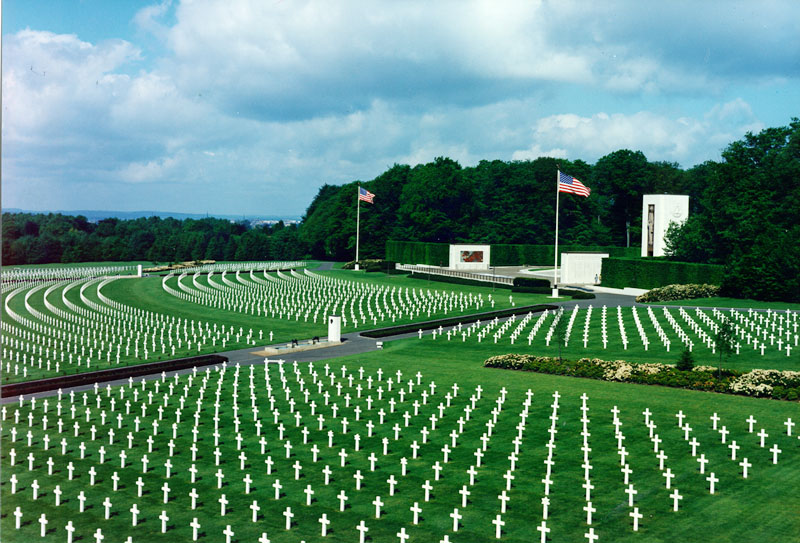It is springtime in 1974 and the team is traveling from our headquarters in Kaiserslautern, West Germany to minister in Belgium. We are part of a year-long pilot missions program, traveling to churches and American military bases around western Europe. This trip takes us through Luxembourg, that small, picturesque country situated between Germany, Belgium, and France. The decision is made to stop at Luxembourg American Cemetery and Memorial.
I am nineteen years old and have never been to a military cemetery. We disembark from the bus and walk through the tall black metal gates. They are hung with gold metal wreaths that for centuries have signified valor. A beautiful chapel rises ahead, surrounded by a wide stone terrace. Fanning out from the terrace are the graves of 5,074 American soldiers. Most of them died in the Battle of the Bulge, the last major battle of World War II. In brutal winter conditions, these warriors were among those who denied the Nazis victory in their last desperate offensive of the war. General George S Patton’s 3rd Army was headquartered in Luxembourg. When his 350,000 men arrived to punch through the German flank and relieve the exhausted 101st Airborne, the tide of war turned. In a battle that lasted 44 days—December 16th, 1944 – January 28, 1945—the U.S. lost 19,000 soldiers.
In the spring sunshine I stand in shock, reeling from the sight of seemingly endless rows of crosses. American soldiers, many of whom had suffered terribly in the bitter cold before losing their lives, now lying in this beautiful place far, so far, from home. Struggling to take it in, I experience what so many people continue to experience in these hallowed places in the world: tears and an overwhelming gratefulness. I want to walk every row, touch every cross, and say “thank you”.
That experience has been on my mind this Memorial Day. The cemetery in Luxembourg is one of 26 such American military burial grounds in 17 foreign countries. Colin Powell, at a conference in England, was asked by the Archbishop of Canterbury if America was guilty of “empire building”. Powell responded:
Over the years the United States has sent many of its fine young men and women into great peril to fight for freedom beyond our borders. The only amount of land we ever asked for in return is enough to bury those that did not return.
It is said that in the silence that followed you could hear a pin drop.
And so today I say thank you from the bottom of my heart to all of you who serve—and who have served—our country. And I remember Luxembourg and the many hundreds of acres of white crosses it represents with a heart full of gratitude, as well.

